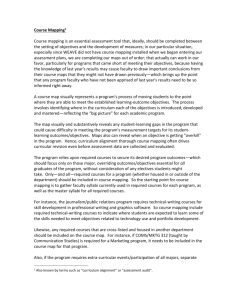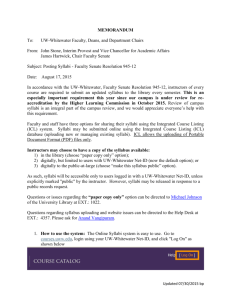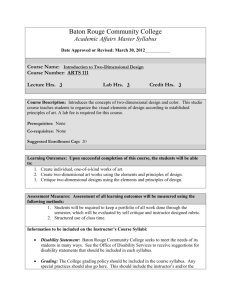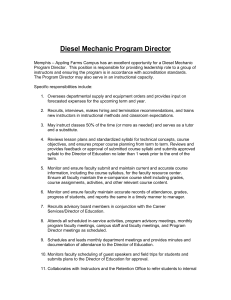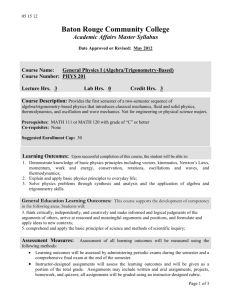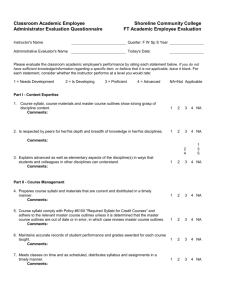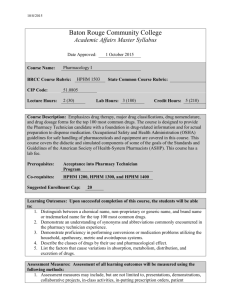course information
advertisement
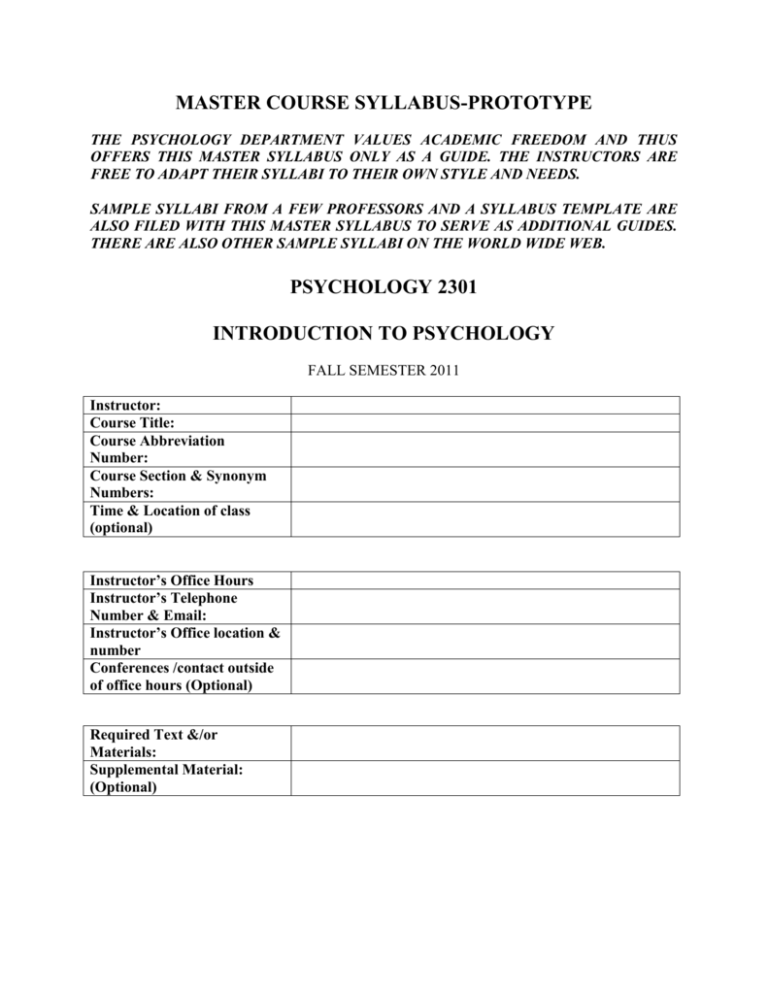
MASTER COURSE SYLLABUS-PROTOTYPE THE PSYCHOLOGY DEPARTMENT VALUES ACADEMIC FREEDOM AND THUS OFFERS THIS MASTER SYLLABUS ONLY AS A GUIDE. THE INSTRUCTORS ARE FREE TO ADAPT THEIR SYLLABI TO THEIR OWN STYLE AND NEEDS. SAMPLE SYLLABI FROM A FEW PROFESSORS AND A SYLLABUS TEMPLATE ARE ALSO FILED WITH THIS MASTER SYLLABUS TO SERVE AS ADDITIONAL GUIDES. THERE ARE ALSO OTHER SAMPLE SYLLABI ON THE WORLD WIDE WEB. PSYCHOLOGY 2301 INTRODUCTION TO PSYCHOLOGY FALL SEMESTER 2011 Instructor: Course Title: Course Abbreviation Number: Course Section & Synonym Numbers: Time & Location of class (optional) Instructor’s Office Hours Instructor’s Telephone Number & Email: Instructor’s Office location & number Conferences /contact outside of office hours (Optional) Required Text &/or Materials: Supplemental Material: (Optional) COURSE INFORMATION COURSE DESCRIPTION This course is a survey of introductory topics such as learning, memory, sensation and perception, personality, life-span development, physiological basis of behavior, stress and health, psychological disorders, social psychology, and research methods. Additional topics such as language development, states of consciousness, and psychotherapy may also be included as determined by the instructor. The Honors course provides a more in-depth introduction to the science and profession of psychology with emphasis on developing oral and written communication skills as they relate to the analysis and discussion of research and controversial issues in psychology. INSTRUCTIONAL METHODOLOGY The instructors for this class may want to include activities that enhance learning such as lecture, small and large group activities, class discussions, films, filmstrips, videos, student presentations, computer-based instruction and activities, library research, and possible field trips, etc…. PLEASE REFER TO SAMPLE SYLLABI GUIDES (PRINT and on the WEB) FOR SPECIFIC EXAMPLES COURSE RATIONALE AND /OR PURPOSE The instructors for this class may want to include a response to the question: What do you deem the purpose of your course will be? PLEASE REFER TO SAMPLE SYLLABI GUIDES (PRINT and on the WEB) FOR SPECIFIC EXAMPLES COMMON COURSE OBJECTIVES/ STUDENT OUTCOMES The common course objectives or goals include the following: The student will be able to demonstrate an understanding of representative theories, findings and/or principles concerning the following topics: Research Methods Personality Learning Life-Span Development Physiological Basis of Behavior Cognition (including Sensation, Perception, and Memory) Stress (as well as intellectual, social, physical and emotional health) Psychological Disorders Social Psychology FOR SPECIFIC LEARNING OBJECTIVES, PLEASE REFER TO SAMPLE SYLLABI GUIDES (PRINT and on the WEB) FOR SPECIFIC EXAMPLES Program Level Student Learning Outcomes: Understand psychological concepts and be able to recognize them in real-world contexts. Acquire a basic understanding of major perspectives in the field. Gain an awareness of the breadth of the academic discipline of psychology. Understand the various research methods psychologists use and critically evaluate evidence. GENERAL EDUCATION STUDENT LEARNING OUTCOMES FOR PSYC 2301 o Critical Thinking Gathering, analyzing, synthesizing, evaluating and applying information. o Technology Skills Using appropriate technology to retrieve, manage, analyze, and present information. o Quantitative and Empirical Reasoning Applying mathematical, logical and scientific principles and methods. o Cultural Awareness Comparing, contrasting, and interpreting differences and commonalities among peoples, ideas, aesthetic traditions, and cultural practices. COURSE GRADE / EVALUATION SYSTEM The instructors for this class will develop their own evaluation system. It is recommended that the instructors be specific and may include the following information: type and number of t ests & quizzes, major assignments or projects, etc. In addition, the instructors may want to include their policy on retests or make-up tests. PLEASE REFER TO SAMPLE SYLLABI GUIDES (PRINT and on the WEB) FOR SPECIFIC EXAMPLES COURSE OUTLINE/CALENDAR The instructors for this class will be responsible for a detailed course outline/ calendar schedule. PLEASE REFER TO SAMPLE SYLLABI GUIDES (PRINT and on the WEB) FOR SPECIFIC EXAMPLES COURSE RELATED POLICIES ATTENDANCE The instructors will develop their own policy on attendance and how it will be factored into the student’s final grade. PLEASE REFER TO SAMPLE SYLLABI GUIDES (PRINT and on the WEB) FOR SPECIFIC EXAMPLES WITHDRAWAL The instructors will develop their own policy on withdrawals and whose responsibility it will be to withdraw a student from your class (yours or the student). PLEASE REFER TO SAMPLE SYLLABI GUIDES (PRINT and on the WEB) FOR SPECIFIC EXAMPLES INCOMPLETE The instructors will develop their own policy on incompletes (i.e. under what conditions will the instructor consider granting a student an incomplete). PLEASE REFER TO SAMPLE SYLLABI GUIDES (PRINT and on the WEB) FOR SPECIFIC EXAMPLES SCHOLASTIC HONESTY/ ETHICAL CONDUCT “Acts prohibited by the college for which discipline may be administered include scholastic dishonesty, including but not limited to cheating on an exam or quiz, plagiarizing, unauthorized collaboration with another in preparing outside work. Academic work submitted by students shall be the result of their thought, research, or self-expression. Academic work is defined as, but not limited to tests, quizzes, classroom presentations, and homework.” (Student Handbook 20022003,p.32). The instructor will be responsible for specifying the penalty that will be assessed for violation of this policy. PLEASE REFER TO SAMPLE SYLLABI GUIDES (PRINT and on the WEB) FOR SPECIFIC EXAMPLES ACADEMIC FREEDOM/LEARNING ENVIRONMENT The instructors will develop their own policy on academic freedom and learning environment (student discipline). The following is an example: In any course that includes discussion and critical thinking, there are bound to be many differing viewpoints, especially on sensitive, controversial topics. We must respect the views of others and create an atmosphere where both the students and the instructor are encouraged to think, learn, and share information. Viewpoints that are carefully thought and expressed in an organized, orderly manner can be used to enhanced learning. These viewpoints as well as any feedback or general comments must be provided in a non-offensive, respectful manner. Your course grade will not be adversely affected by the viewpoints that you may express in class or on assignments. Instead, the grade will be based on your knowledge and understanding of concepts and principles within the specific subject area as well as their theoretical and research-based foundations and applications. PLEASE REFER TO SAMPLE SYLLABI GUIDES (PRINT and on the WEB) FOR SPECIFIC EXAMPLES INSTRUCTIONAL SUPPORT SERVICES OFFICE OF STUDENTS WITH DISABILITIES Each ACC campus offers support services for students with documented physical or psychological disabilities. Students with disabilities must request reasonable accommodations through the Office for Students with Disabilities on the campus where they expect to take the majority of their classes. Students are encouraged to do this three weeks before the start of the semester. .” (Student Handbook 2002-2003,p.14) PLEASE REFER TO SAMPLE SYLLABI GUIDES (PRINT and on the WEB) FOR SPECIFIC EXAMPLES OTHER INSTRUCTIONAL FACILITIES TO BE USED IN THIS COURSE (OPTIONAL ) You may want to include facilities such as the LRS, testing center, etc. PLEASE REFER TO SAMPLE SYLLABI GUIDES (PRINT and on the WEB) FOR SPECIFIC EXAMPLES

